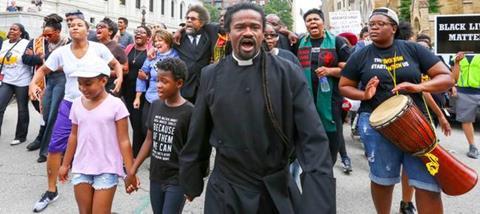
I believe that we must read the signs and wonders of the world.
So if there is a riot in Tottenham, that is a sign and a wonder about the alienation and the isolation that the young people feel inside of Britain.
Or in Ferguson, Missouri Michael Brown’s body lay in the street for four and a half hours. Then the police let dogs urinate on where his blood was, and they were going to put his body in the trunk of a car.
And then I see young people rebel against that; they begin to turn tables over in both of those places.
They criticise the Church, because the Church isn't showing up for them.
Then I think about Jesus coming into Jerusalem and saying: “you’ve turned my house of prayer into a den of robbers and thieves” to the elite there. After that he goes and curses the fig tree, but he isn't talking about the fig tree, he’s talking about the Church.
God chose to be born in an unimportant part of the world, living under occupation. And that peasant defeated the empire. That’s how I understand the gospel. But I look at the Church’s moral and ethical responsibility at this historical moment, and I see that young people are feeling isolated and alienated from the Church. It seems the Church is more interested in having access to the empire rather than prophesying to it.
God is saying what God has always said; wherever there are those who are suffering, we’re called to stand in solidarity with them, and not simply serve the poor, but to see God at work in them.
Changing the atmosphere
I covered the London riots for Vibe magazine in 2011. I was blessed to spend time with Mark Duggan’s family and the leaders in that community. I was also in Ferguson after the killing of Michael Brown, and I was in the streets when they decided that they would not indict his killer - the police officer Darren Wilson. So I was there when the riots were happening.
Martin Luther King said that riots are "the language of the unheard".
I remember being in the middle of riots, and smoke, and gunshots, and buildings burning, and young activists who had been promised that justice would be served if they held on.
I also spent some time recently in Charlottesville, where Nazis were marching in the streets.
I was there for four weeks organising pastors with various groups including Black Lives Matter. There were 500 Nazis in this park. There are about a dozen men holding machine guns, who are facing clergy; we’re in robes, praying; and then other Nazis marching behind us yelling slurs – mostly homophobic slurs – at us.
We had planned to be quiet. But you could feel the tension, because the Nazis wanted to fight.
The Church is more interested in having access to the empire rather than prophesying to it.
I could feel the tension rising, and then we just broke out in this old song my grandmother used to sing: "This joy that I have, the world didn’t give it to me. This joy that I have, the world didn’t give it to me. This joy that I have, the world didn’t give it to me. The world didn’t give it and the world can’t take it away”.
The whole spirit of things changed; the Nazis got quiet. With the Holy Ghost there is something special that happens.
There’s a power there, and I want to be able to recognise it in kids with tattoos on their face; I want to recognise it in single mothers; I want to see where God is.
Because God likes to show up in these places. God could have gone to Rome, God could have picked up way more fancy people to reveal himself to. But God chooses to come, in the body of an unwed teenage mother, among an unimportant people, in an unimportant part of the world. God chose to be a handyman, living under occupation, and was crucified by the state instrument of death. And we believe something happened early one Sunday morning.
Rev Sekou is a singer-songwriter, philosopher, theologian, author and activist
Click here to listen to Rev Sekou talking to Muyiwa on Premier Drive
Click here for a free sample copy of Premier Christianity magazine





























